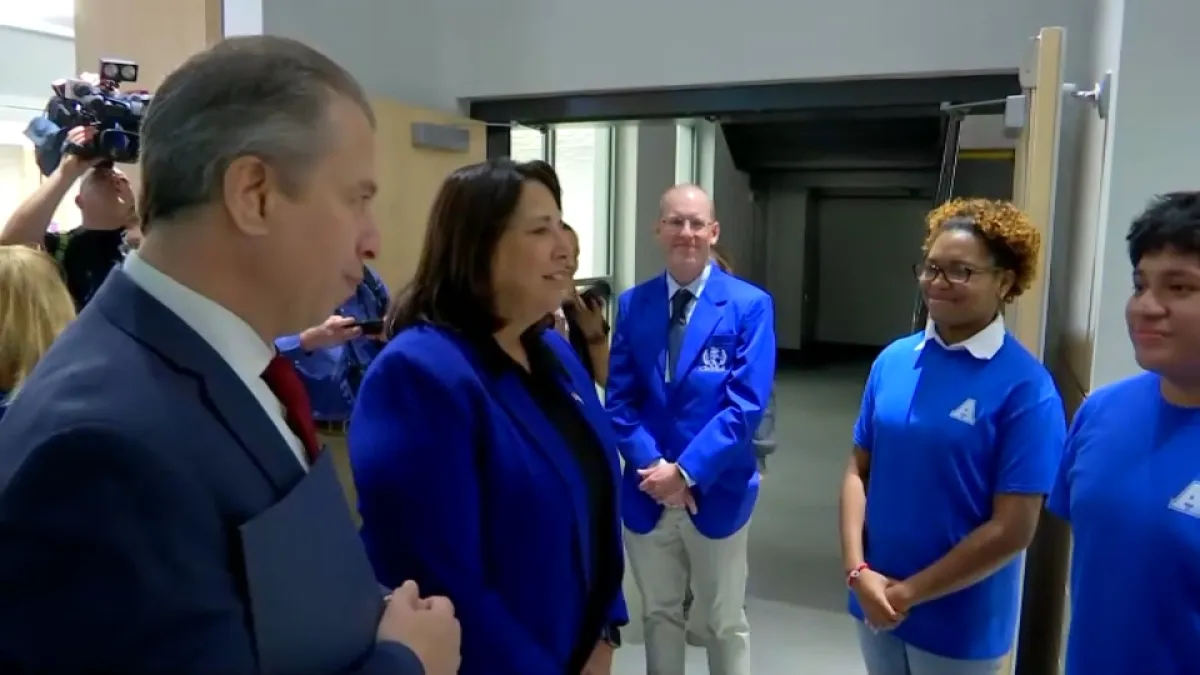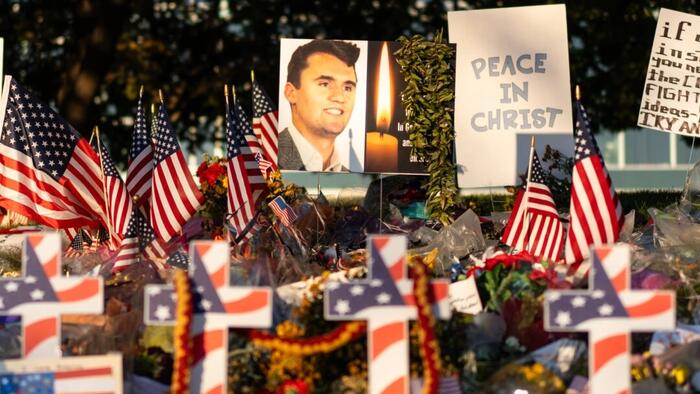
The panel that’s developing a new high school graduation standard in Massachusetts released its first work product Wednesday, sharing a “vision” of a set of familiar skills and attributes that a high school graduate in the state should possess before they’re ready for either college or a career.
Lt. Gov. Kim Driscoll and Education Secretary Patrick Tutwiler joined members of the Massachusetts K–12 Statewide Graduation Council and other education policy-makers to roll out the “vision of a graduate” at Attleboro High School after a tour of the school’s career technical education programs. The statement of ideals is meant to form a foundation for a statewide framework.
“The Vision of a Graduate gives us a thoughtful, unifying blueprint for what it means to graduate high school in Massachusetts,” said Dr. Tutwiler, Statewide K-12 Graduation Council Co-Chair. “It emphasizes that every student has the capacity to be a thinker, contributor, and leader and that our job as educators and communities is to nurture those qualities every step of the way.”
Gov. Maura Healey convened the group in January after voters last fall eliminated the use of the Massachusetts Comprehensive Assessment System exam (MCAS) as a graduation requirement. Public school students were previously required to take the MCAS in 10th grade in order to earn a diploma in the Bay State.
Until the state comes up with a single new standard, the Board of Elementary and Secondary Education has adopted interim graduation requirements, including that students complete specific coursework through grade 10. Individual districts must develop and submit a local Competency Determination (CD) policy and graduation requirements to the state by Dec. 31.
The document released Wednesday envisions high school graduates as thinkers, contributors, and leaders.
Local
In-depth news coverage of the Greater Boston and New England area.
“A Massachusetts diploma is not just a credential; it is a launchpad for students to become effective thinkers, valued contributors, and future leaders of their communities and beyond,” the document says. “Together, these competencies not only prepare MA graduates for success in college and career, but equip them with the knowledge, skills, and dispositions to participate fully in civic life.”
Thinkers
• Academically Prepared: Graduates have a strong foundation across academic disciplines, equipping them with both the knowledge to thrive in college, career, and civic life and the skills to be lifelong learners.
• Critical Problem-Solvers: Graduates critically examine information to draw connections, question assumptions, infer meaning, and shape solutions.
Contributors
• Self-Aware Navigators: Graduates understand themselves, their strengths, and their opportunities and can effectively leverage their unique skills to navigate a variety of paths and environments.
• Intentional Collaborators: Graduates engage respectfully and productively with diverse individuals and groups, recognizing the value of their unique perspectives, identities and experiences as well as those of others.
Leaders
• Effective Communicators: Graduates confidently and clearly express their ideas to diverse audiences across a variety of mediums.
• Responsible Decision-Makers: Graduates can set and pursue personal goals, make healthy and financially sustainable choices, and demonstrate confidence and competence in shaping their lives.
Gov. Maura Healey said in a statement that Massachusetts has always led the way in education, and that this vision builds on that legacy.
“We all need to work together to make sure our young people are prepared not only with strong academic skills but also with the problem-solving, collaboration and leadership abilities they’ll need to succeed in every aspect of life,” the governor said.
Driscoll said the vision reflects what educators, students, families and community leaders have told the administration they want for our young people.
“This is about developing self-aware, confident graduates who can work with others, make thoughtful decisions, and contribute meaningfully to their schools, workplaces and communities,” the lieutenant governor said.
Massachusetts Teachers Association President Max Page and Vice President Deb McCarthy said in a statement they were pleased the “vision of a graduate” emphasizes core skills and attributes that are “essential to the success of our young people as citizens, workers and lifelong learners.”
“Educators and voters have made clear that such essential skills cannot be assessed by a standardized test,” the joint statement read. “We will only nurture students to be ‘critical problem solvers, intentional collaborators, effective communicators, self-aware navigators, and responsible decision-makers’ if we design educator-led systems of assessment and provide the necessary resources that educators, students and schools need to fulfill these goals.”
The “vision of a graduate” released Wednesday was the first work product of the Statewide Graduation Council. It will be followed later this year by a report of initial findings, officials said. The 31-member group is expected to issue its final recommendations by July 2026.
House Speaker Ronald J. Mariano, D-Quincy, said ensuring that every student who graduates from a Massachusetts school meets clear, consistent, and rigorous standards is not only critical to student success beyond the classroom, but that it’s also about “fairness and opportunity.”
“The House is grateful to the Healey-Driscoll Administration and to the Graduation Council for their ongoing work towards establishing a statewide standard that reinforces the high expectations that all students across the Commonwealth deserve,” Mariano said in a statement.



